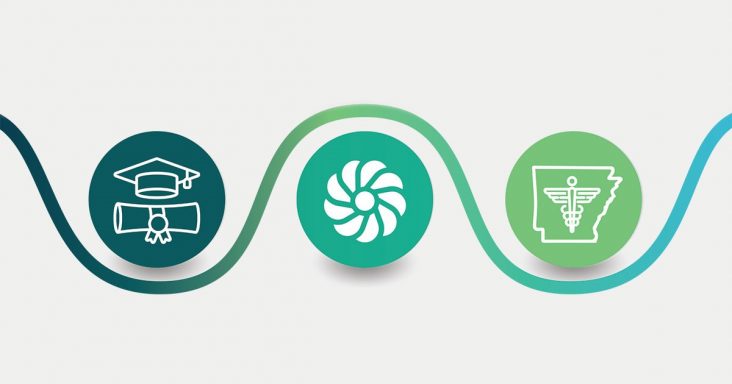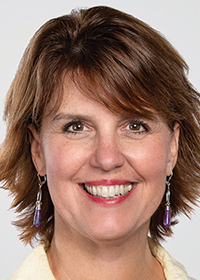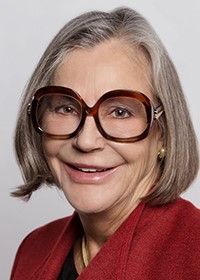Whole Health medical school will ‘raise the bar’ for integrative healthcare
by March 18, 2021 10:28 am 3,410 views

From the University of Arizona to the Duke University Health System and the Veterans Health Administration (VHA), Dr. Tracy Gaudet has worked to drive improvements in integrative medicine, taking account of the whole person, including all aspects of lifestyle.
The work in that arena she is doing now in Northwest Arkansas is groundbreaking — literally and figuratively.
Gaudet will play a leading role in developing a new four-year medical school in Bentonville, called Whole Health School of Medicine and Health Sciences. It will be a standalone sister organization of Bentonville nonprofit Whole Health Institute, created last year to make a transformative approach to health and well-being available to everyone.
Walmart Inc. heiress and philanthropist Alice Walton is behind both organizations. The institute’s construction on the Crystal Bridges Museum of American Art campus will start this spring.
The medical school’s construction is expected to begin in 2022. The first students will begin classes in 2024 and will graduate in 2028. The school’s location is still being determined.
“Many, many people have been trying to bring improvements to health and well-being,” said Gaudet, whom Walton recruited to be the Whole Health Institute’s founding executive director. “But when you’re pushing it into something existing — in this case medical curriculum — it’s tough to make a significant change. Everything already is what it is.
“To build this [medical school] from the ground up and integrate these philosophies and approaches to health and well-being into the mainstream curriculum is … nobody has ever done it.”
Gaudet left the VHA, the country’s largest integrated healthcare system, in August 2019, where she led the agency’s Office of Patient Centered Care and Cultural Transformation. The office was charged with leading VHA’s transformation to whole health, an approach to healthcare that empowers and equips people to take charge of their health and live their life to the fullest.
That represented a fundamental re-envisioning and redesign in the philosophy and practice of healthcare delivery for veterans.

Gaudet said she did not know Alice Walton until being recruited to Northwest Arkansas for the job at the institute. In a short time frame, though, she’s learned a lot about the philanthropist.
“What I’ve learned very quickly is the degree of passion and commitment Alice Walton has for making this approach available and accessible for all people and all communities,” she said. “This is her drive, and I’m on board with that. It’s a huge undertaking, and it’s going to take some time, but it has to impact every person and every community. That’s her vision, and that is what she is committed to doing. And so are we.”
Now working for Walton, Gaudet leads what could be a significant roll-out of that whole health model to healthcare organizations and communities across the country. The Whole Health Institute and its sister medical school are an initial step.
“COVID has shined a very bright light on some significant issues of the limitations of our current healthcare system,” Gaudet said. “I’m a physician. We educate physicians very well in some things. It’s a system designed to find problems and fix them. If someone has appendicitis, we cut out their appendix. We have cured them. The shortcoming is that lifestyle choices and the way we live our lives drive the vast majority of chronic conditions.
“Heart disease is the No. 1 killer of men and women in America and worldwide. Lifestyle choices could prevent 90% of heart disease. It’s not the clinicians’ fault, and it’s not a fault of us living our lives. The system that we designed does not have a core competency in empowering and equipping people to take charge of their lives and health. We’re not designed to do it.”

Gaudet said the Bentonville medical school will have a curriculum teaching “all that medicine does well right now,” with some integrative techniques related to whole health philosophy.
“We will infuse the skills and systems to support people in really taking charge of their lives and health and being empowered and equipped to do that,” she said.
Gaudet said the medical school will include between 40 and 50 students in its initial class in 2024. It’s already recruited a founding dean from Texas (Elly Xenakis), an executive vice dean from North Carolina (Colleen O’Connor) and vice dean for education from Wisconsin (Adam Rindfleisch).
The medical school seeks accreditation from the Liaison Committee on Medical Education, the accrediting body for educational programs at medical schools in the United States and Canada. The curriculum will include biomedical sciences, clinical training, medical entrepreneurship, research, and a capstone with whole health principles.
Whole Health will offer a four-year, allopathic program, meaning graduates will receive a Doctor of Medicine (MD) degree. Health Sciences degrees and certificates will be offered, including functional nutrition, mental health, social work and health coaching; faculty development in whole health approaches; and national certification of existing educational programs aligning with whole health principles and practices.
The School of Medicine and Health Sciences will collaborate closely with the state’s healthcare community and seek clinical affiliations with local inpatient and outpatient providers. School officials and the University of Arkansas for Medical Sciences (UAMS) Northwest in Fayetteville — a satellite campus of Little Rock-based UAMS, the state’s only academic medical campus — are already discussing opportunities to collaborate, as opposed to competing against one another.
“UAMS Northwest looks forward to partnering with the Whole Health School of Medicine and Health Sciences as we continue to educate the next generation of healthcare professionals and as we work to improve the health of our region and our state,” Dr. Pearl McElfish, vice chancellor for UAMS’ Northwest Arkansas regional campus, said in a statement to the Northwest Arkansas Business Journal.
Discussions are also underway for ongoing collaborations with local providers and the Northwest Arkansas Council Healthcare Transformation Division. That includes Arkansas Children’s Northwest, Community Clinic, Mercy Hospital Northwest Arkansas, Northwest Medical Center, Washington Regional Medical Center, UAMS, the University of Arkansas and Veterans Health Care System of the Ozarks.
In 2019, the Northwest Arkansas Council, one of the region’s most influential nonprofit groups, released a report that found the region lost nearly $1 billion per year because people left Northwest Arkansas for high-level specialty care. The council’s plan for addressing that issue included adding 200 additional residency positions, increasing integrative research to attract high-quality physicians and establishing a four-year medical school.
Ryan Cork, named earlier this year as the executive director of the council’s healthcare transformation division, said the Whole Health Institute and the medical school are examples of Northwest Arkansas making “bold moves” to ensure the region becomes one of the world’s premier healthcare destinations.
“The medical school will raise the bar with its innovative approach to health and well-being and also give healthcare systems throughout the region and state a new pipeline to recruit high-quality physicians,” he said.
